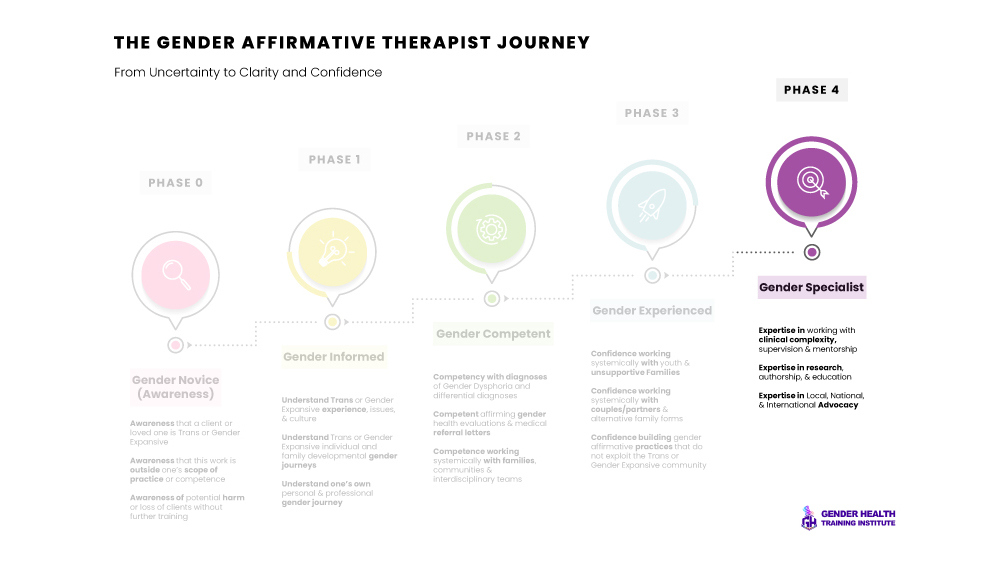
Be a Leader, a Mentor, an Advocate
Becoming a Gender Specialist isn’t only about mastering clinical knowledge—it’s about interdisciplinary navigation, mentoring peers, leading systemic change, and ensuring every step of care is affirming.
Phase 4 of the Gender Affirming Therapist Journey represents the culmination of your training, where you become a Gender Specialist, equipped to provide expert, compassionate, and evidence-based care to transgender and gender-diverse clients. In this phase, you develop the skills to navigate complex clinical and psychosocial scenarios, including medical interventions, hormone therapy, and surgeries, understanding how decisions in one area can impact other aspects of a client’s health. Moving into the role of Gender Specialist requires advanced, evidence-based training that equips you with both general mental health treatment skills and specialized expertise in gender-affirming care (Holt, et al., 2023). Being a Gender Specialist is about mastery, mentorship, advocacy, and science-informed care. Not only are you supporting individual clients, you’re contributing to the transformation of clinical practice, public understanding, and societal attitudes toward gender diversity.
Scientific knowledge is central: recent research demonstrates that neurological differences related to gender identity occur before any medical intervention, providing a robust evidence base for affirming care (Kurth, et al., 2022). Specialists use this science to educate clients, colleagues, and the broader community, dispelling myths and improving access to care. Gender Specialists should be prepared to integrate this evidence into clinical judgment and psychoeducation for clients.
Beyond direct care, Gender Specialists engage in advocacy, research, and public education, raising awareness of systemic barriers, discrimination, and the lived experiences of trans individuals. They contribute to research, publications, and professional discussions, helping shape policies and societal understanding. With the plethora of anti-LGBTQ bills proposed and passed across the country, the stress and fear stemming from these harmful attacks increases the danger of seeking gender affirming care, and bleeds into other aspects of clients’ lives, both public and private (Rastogi, et al., 2025). Research has shown transgender adolescents and young adults are among the least supported by family, often leading to complicated familial dynamics (James, et al., 2024). Providers must consider these aspects of client care and recognize the complexity of these situations.
As a Gender Specialist, you are both a clinician and a community advocate. Transgender and gender expansive individuals perpetually experience discrimination, mistreatment, and systemic barriers when accessing mental health and medical services (Stryker, et al, 2022). Though most transgender individuals have healthcare coverage, at least one-quarter have experienced issues with their insurance companies, including coverage denial for gender-affirming treatment such as hormone therapy or surgery (James, et al., 2024). Almost half of clients have had at least one negative interaction with a healthcare provider related to their gender (Rastogi, et al., 2025).
Many avoid care due to previous negative encounters with mental health professionals (MHPs), highlighting the need for highly trained Gender Specialists. Collaborative, interdisciplinary care with counseling is essential, especially regarding fertility decisions (Croteau, et al., 2025). In helping clients navigate medical, social, and psychological challenges, you are simultaneously shaping societal understanding. Through your work, you are engaging in public advocacy, raising awareness about discrimination, systemic barriers, and the lived experiences of trans people.
In essence, Gender Specialists in Phase 4 combine clinical expertise, mentorship, advocacy, and evidence-based practice, supporting clients while advancing knowledge and societal acceptance of gender diversity. As a Gender Specialist, you are adept at recognizing the emotional complexity of medical and social alignments. Even desired interventions, like surgeries, can involve grief or psychological adjustment, highlighting the importance of nuanced, client-centered support.
A key role of a Gender Specialist is mentorship, guiding other therapists through challenging cases and promoting best practices within the field. Moving forward, you can further develop your expertise and expand on your level of knowledge through specialized seminars and mentorship programs such as the GHTI Advanced Coaching & Mentorship Program.
Croteau TA, Gelech J, Morrison MA, Morrison TG. Psychological and Physical Health Outcomes Associated with Gender-Affirming Medical Care for Transgender and Gender-Diverse Youth: A Critical Review. Healthcare. 2025; 13(14):1659. https://doi.org/10.3390/healthcare13141659
Holt, N. R., Hope, D. A., Mocarski, R., & Woodruff, N. (2023). The Often-Circuitous Path to Affirming Mental Health Care for Transgender and Gender-Diverse Adults. Current psychiatry reports, 25(3), 105–111. https://doi.org/10.1007/s11920-023-01410-2
James, S.E., Herman, J.L., Durso, L.E., & Heng-Lehtinen, R. (2024). Early Insights: A Report of the 2022 U.S. Transgender Survey. National Center for Transgender Equality, Washington, DC.
Kurth F, Gaser C, Sánchez FJ, Luders E. Brain Sex in Transgender Women Is Shifted towards Gender Identity. J Clin Med. 2022 Mar 13;11(6):1582. doi: 10.3390/jcm11061582. PMID: 35329908; PMCID: PMC8955456.
Rastogi, A., Menard, L., Miller, G. H., Cole, W., Laurison, D., Caballero, J. R., Murano-Kinney, S., & Heng-Lehtinen, R. (2025, June). Health and wellbeing: A report of the 2022 U.S. Transgender Survey. Advocates for Transgender Equality. https:// ustranssurvey.org/download-reports/
Stryker, S. D., Pallerla, H., Yockey, R. A., Bedard-Thomas, J., & Pickle, S. (2022). Training Mental Health Professionals in Gender-Affirming Care: A Survey of Experienced Clinicians. Transgender health, 7(1), 68–77. https://doi.org/10.1089/trgh.2020.0123
Phase 4 Clinical Resources:
Free article:
Best Practices and Challenges in Counseling Trans, Non-Binary, and Gender-Expansive Students: An Example Case Study from College Counseling Centers
Authors: Shannon Shoemaker, Levi White & Stephanie Snyder, August 2025
Book:
Gender-Affirming Psychiatric Care
Edited by Teddy G. Goetz, M.D., M.S., and Alex S. Keuroghlian, M.D., 2024
